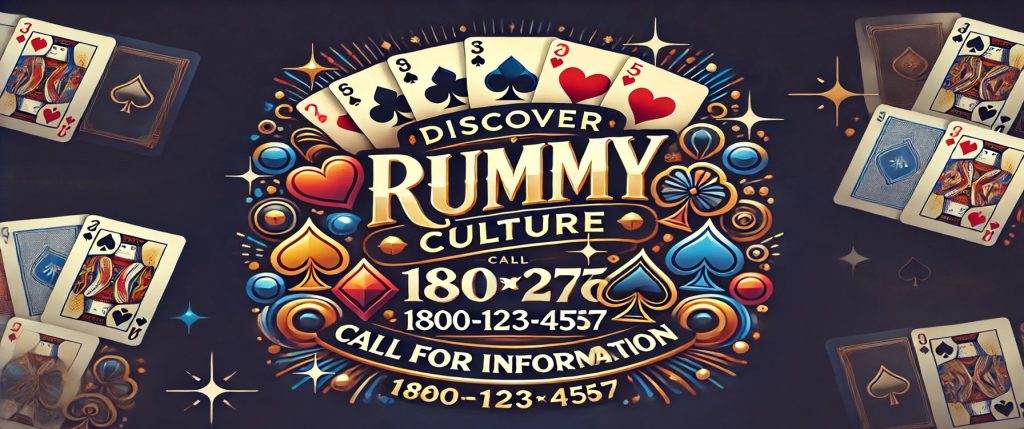
A Complete Examination of Rummy Culture Rummy is a cultural phenomenon that cuts across social classes and geographic borders, & it is more than just a card game. Rummy has existed in many forms all over the world & is now a common game at social events, family get-togethers, & competitive tournaments. Millions of people love playing the game because it encourages strategic thinking and teamwork. It is appealing because it fosters social interactions in addition to the excitement of competition. Rummy embodies a special fusion of skill, luck, and psychological warfare, whether it is played in high-stakes tournaments or casually among friends.
Rummy has a rich and varied cultural heritage, with regional variations giving the game a unique flavor. For example, rummy is a game that is frequently played during family get-togethers and festivals in India, acting as a unifying activity. Western nations, on the other hand, might place more emphasis on the game’s competitive elements, with professional players & organized leagues.
This cultural contrast shows how rummy can be played in a variety of social settings while staying true to its fundamental ideas. We will discover the rich tapestry that makes rummy a popular past time around the world as we dig deeper into the game’s history, variations, and etiquette. There are several theories that try to explain the somewhat hazy origins of rummy.
Some historians contend that the game originated from the 19th-century Chinese card game “Kong.”. Some contend that it shares similarities with the European game “Loo” or even the Mexican game “Concentration.”. Whatever its exact origins, rummy as we know it today started to develop in the early 1900s. When people were looking for inexpensive entertainment during the Great Depression, the game’s popularity skyrocketed in the US in the 1930s.
Rummy experienced several modifications and changes as it traveled across continents. Known for its focus on combining cards into sets or runs, the game was frequently played in the US using a standard 52-card deck. In the meantime, distinct versions that took into account regional laws & customs arose in nations like Brazil and India. Rummy’s development is a reflection of larger social shifts, such as changes in recreational pursuits and the growing internationalization of gaming.
In addition to being a well-liked card game nowadays, rummy plays a big role in the social fabric of many cultures. There are a staggering number of variations of rummy, each with its own set of rules and tactics. Gin Rummy is a very popular variation that is usually played by two players. In this version, players try to minimize the number of unmatched cards while forming sets and runs.
Gin Rummy is easy enough for novices to learn, but it still has depth for more experienced players. With two decks of cards and the requirement that players form at least two sequences, one of which must be a pure sequence devoid of jokers, Indian Rummy is another popular variation. Canasta and Kalooki Rummy are two other noteworthy variations that add distinctive twists to the classic gameplay.
While Canasta places a strong emphasis on cooperation and teamwork between partners, Kalooki Rummy adds wild cards & permits more intricate strategies. In addition to increasing the game’s appeal, these modifications accommodate a range of player tastes and ability levels. Every game is unique as players experiment with these various variations of rummy, finding new obstacles and chances to use strategic thinking. Once a recreational activity, rummy has developed into a competitive sport with tournaments held all over the world. Players of all skill levels attend these competitions, ranging from novices hoping to prove themselves to seasoned pros fighting for sizable cash payouts. Major competitions frequently have several rounds and different formats, enabling players to demonstrate their abilities in a variety of play styles.
The excitement of competition gives the game a thrilling new dimension & turns it from a relaxing pastime into a heart-pounding activity. Rummy competition has been transformed by online platforms in addition to conventional live tournaments. Players can now connect with opponents from all over the world while playing in virtual tournaments from the comfort of their homes.
Due to this change, more people can now play competitive rummy at a higher level, democratizing access to the game. The legitimacy of rummy as a competitive sport is further cemented by the frequent inclusion of leaderboards, rankings, and even sponsorship opportunities for top players in online tournaments. Establishing a polite & entertaining gaming environment requires an understanding of rummy etiquette & rules. Certain universal principles apply to all variations of rummy, even though specific rules may change based on the variation being played.
For example, while playing, players should stay focused on their opponents’ turns and refrain from being distracted. Remaining focused not only improves performance on an individual basis but also demonstrates consideration for other players who share the same level of interest in the game. Also, players of rummy must be honest; they cannot cheat or change the rules for their own benefit. Everyone is given an equal chance to succeed based on their abilities and strategies thanks to this dedication to fair play.
Also, players should congratulate their opponents and keep a positive attitude throughout the game, regardless of whether they win or lose. This is an example of good sportsmanship. Players help create a friendly environment that promotes competition and friendship by following these etiquette rules. Playing rummy has many social and cognitive advantages that go beyond simple enjoyment.
Its capacity to improve critical thinking and strategic planning abilities is among its most important benefits. Players are required to continuously assess their cards while predicting the moves of their opponents, which develops mental dexterity and fast decision-making skills. Younger players honing their analytical skills or older adults looking to maintain mental acuity may find this mental exercise especially helpful.
Also, rummy is a great social game that encourages communication between friends and family. Playing the game cooperatively in groups or pairs promotes cooperation & communication. In addition to teaching people important lessons about patience & resilience—qualities that are crucial at the card table and in life—it gives people a chance to connect over common experiences. Players develop closer bonds that go far beyond the game itself as they work through victories and defeats together. Practice and commitment are necessary to improve your rummy skills, but there are a few tactics that can hasten the process.
Above all, it is essential to fully comprehend the rules; being aware of the game’s mechanics enables you to make wise choices while playing. Also, researching different tactics used by seasoned players can yield insightful information about efficient gameplay methods. You can get ideas for new strategies to apply to your own style by seeing how other people handle their hands or meld cards.
Regular practice, whether with friends or online platforms that provide practice modes or casual games against AI opponents, is another efficient way to improve your skills. Playing consistently exposes you to a variety of playing styles & helps reinforce learned strategies. Also, evaluating your gameplay after every session can highlight areas for development; think about keeping a journal in which you record both successful tactics and errors you make while playing. Over time, this introspective practice will help you develop as a player. If you want to learn more about rummy, there are a lot of resources that can accommodate different learning styles.
Comprehensive sections on rummy tactics, rule variations, and historical background are frequently found in books devoted to card games. Both novices looking for basic information and seasoned players looking to hone their skills can benefit greatly from these texts. Through tutorials, videos, and forums where players exchange advice and experiences, online resources also provide a plethora of knowledge about rummy. Players can stay up to date on current trends in the rummy community by reading articles about strategies or recent tournament results found on websites devoted to card games.
Also, you can network with other players who are as passionate about this classic card game as you are by joining local clubs or online communities. Through the utilization of these resources, anyone can improve their overall gaming experience and gain a deeper understanding of rummy. To sum up, rummy is more than just a card game; it’s a rich cultural experience that has changed over time while retaining its fundamental appeal for all ages.
Rummy continues to enthrall players worldwide with its fascinating history, wide variety of variations, competitive tournaments, and social benefits. There are countless opportunities to participate in this cherished activity, regardless of your level of experience or desire to learn.





